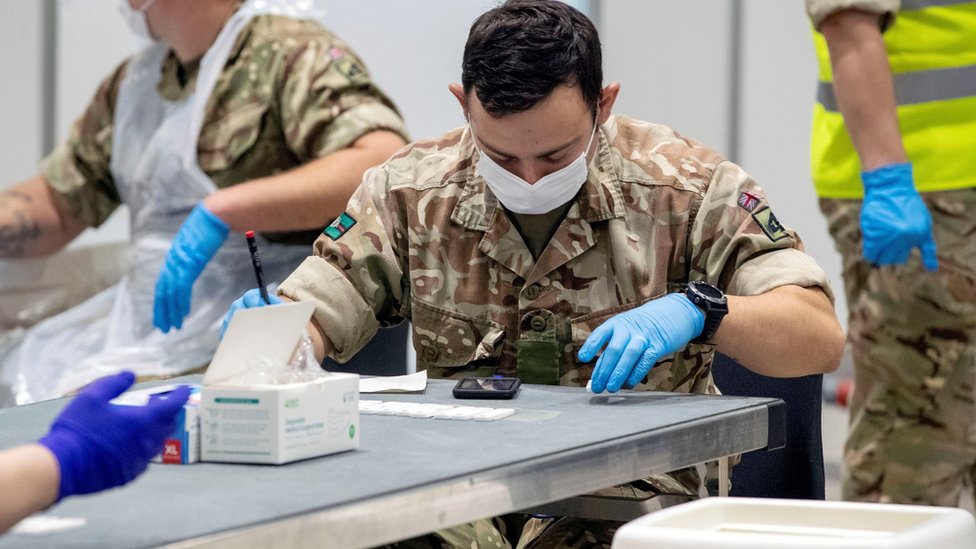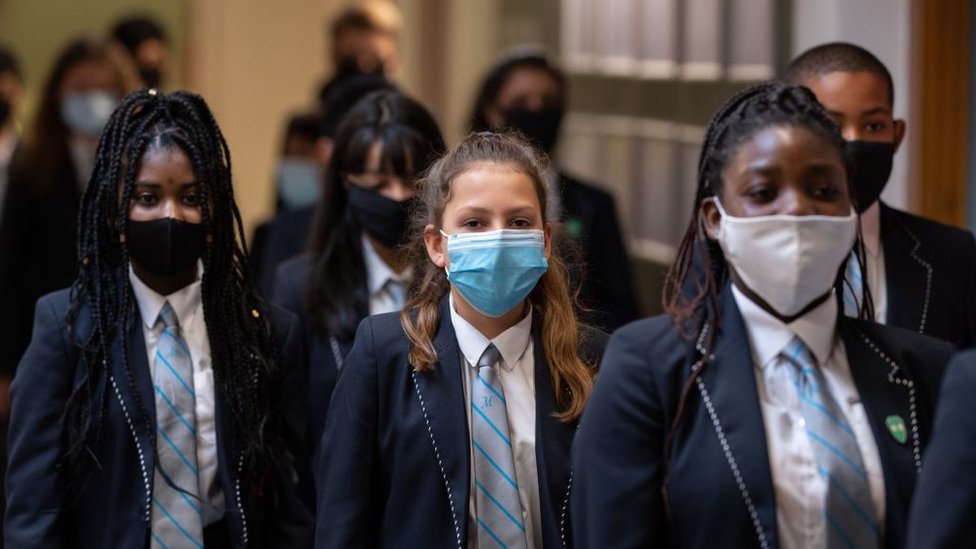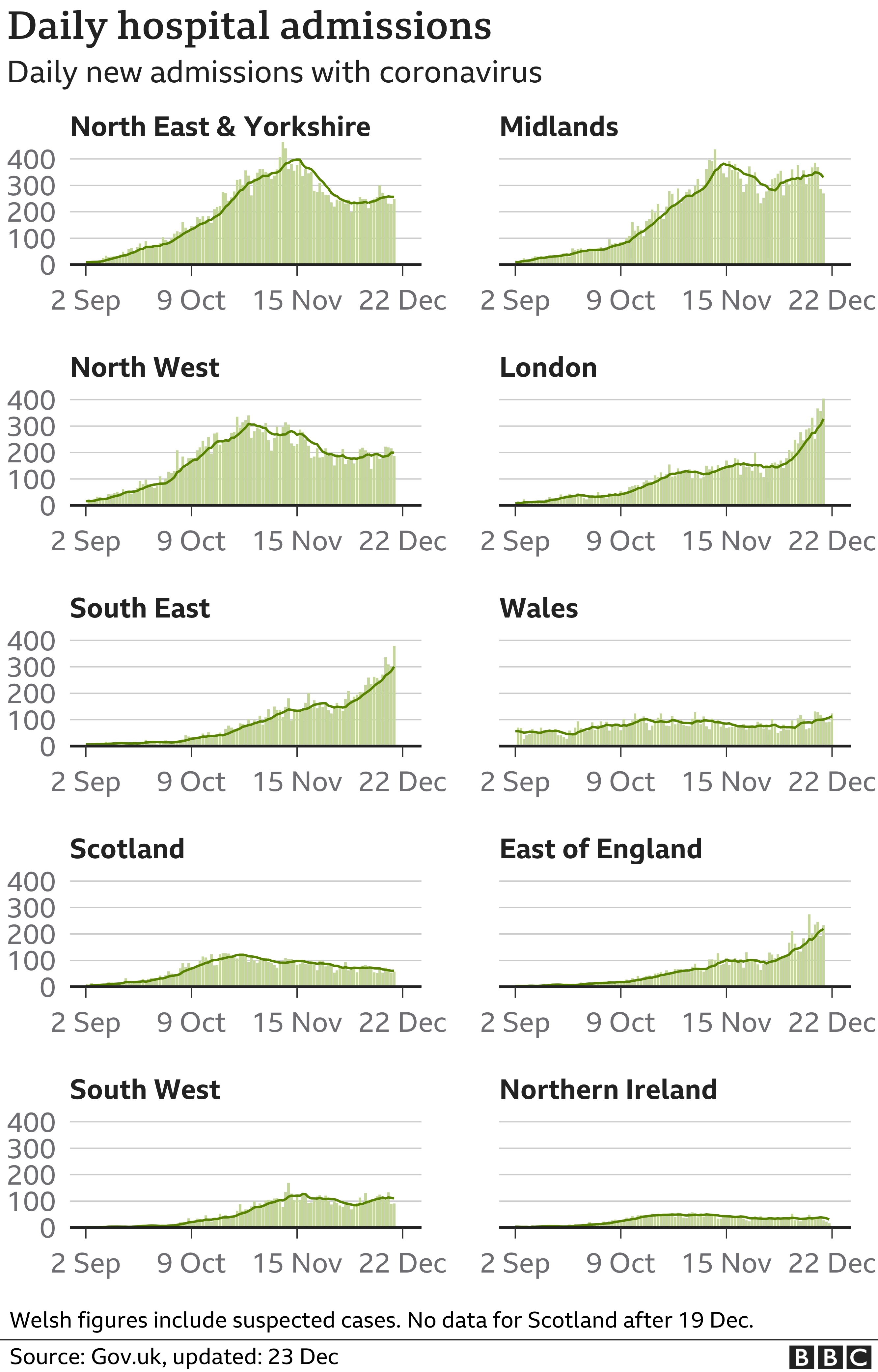
Members of the armed forces will be on standby to help roll out mass testing to secondary schools and colleges in England from next month.
The Ministry of Defence said 1,500 military personnel will provide support for the testing scheme, which aims to help students return safely in January.
Some secondary school pupils are due to return after the Christmas break.
But the government is facing calls to change its plans due to the spread of the new coronavirus variant.
A majority of secondary school pupils in England are due to begin the term studying remotely, to give head teachers time to implement a coronavirus testing programme for students and staff.
The MoD said the majority of the 1,500 personnel will form local response teams, providing support and phone advice to institutions needing guidance on the testing process and set-up of testing facilities.
According to the department, support will be done "predominantly through webinars and individual meetings", but teams would also be on standby to provide in-person support at short notice.
Students will swab themselves in the vast majority of cases, under the supervision of a school staff member or volunteer who has been trained for the role, and teachers are not expected to take a role in the testing process.
Defence Secretary Ben Wallace said the armed forces would share their "considerable experience" of using rapid mass testing kits - known as lateral flow tests - that do not require lengthy lab work to provide a result.
The military has previously helped organise mass testing in Liverpool and more recently in Kent to clear the backlog of lorries caused by France shutting its UK border.
Education Secretary Gavin Williamson said: "It is a true cross-government effort to make sure secondary schools and colleges have the support, guidance, materials and funding they need to offer rapid testing to their staff and students from the start of term."

It comes as two teaching unions warned that allowing students to return after the Christmas break will put them at risk of catching the new fast-spreading coronavirus variant.
Preliminary research by the London School of Hygiene and Tropical Medicine has suggested schools and universities might need to close on top of existing tier four restrictions to bring the new variant under control.
On Monday, Dr Patrick Roach, general secretary of the NASUWT, called on the education secretary to allow schools to move to remote learning for all pupils - except those deemed to be vulnerable or the children of key workers - in the highest tier areas.
And Mary Bousted and Kevin Courtney, the joint general secretaries of the National Education Union, said schools and colleges should remain closed for at least the first two weeks of January, except for vulnerable children and the children of key workers.
However, senior Conservative MP Robert Halfon, who chairs the Commons Education Committee, said keeping children in schools and learning must be the government's "priority".
He said: "What needs to happen is volunteers - perhaps the armed forces, perhaps mobile units outside schools or in school playgrounds - making sure pupils and teaching staff are tested and also rolling out vaccinations as a priority for all those in schools."
Cabinet minister Michael Gove said he expected Year 11 and Year 13 pupils to return in the first week of January, with the rest going back to the classroom later in the month.
But he added that the matter was kept "under review".
A meeting was held between ministers, Downing Street officials and the Department for Education on Monday to discuss the plan further, but the department would not comment on its outcome.

How are the UK nations returning to school?
- England: Secondary school pupils in exam years will return at the start of term while others begin their learning online. Face-to-face learning is expected to resume for everyone by 11 January. Primary schools will return as normal
- Scotland: Schools will start term on 11 January with learning taking place online until at least 18 January.
- Wales: Term will start with online learning, but the majority of pupils are expected to resume face-to-face lessons by 11 January. A full return to the classroom is expected to be complete by 18 January
- Northern Ireland: All schools will initially reopen for face-to-face teaching at the start of term, but years 8 to 10 will move to remote learning from 25 January for at least two weeks
Schools in all the UK nations are remaining open for vulnerable children. England, Wales and Scotland have also committed to maintain face-to-face teaching for children of key workers.


- SCHOOLS: What will happen if children catch coronavirus?
- SOCIAL DISTANCING: Can I give my friends a hug?
- LOOK-UP TOOL: How many cases in your area?
- LOCKDOWN LOOK-UP: The rules in your area

Monday saw the highest number of new cases since mass testing began in the UK, with a record 41,385 positive tests reported.
NHS England said the number of people being treated for the virus in hospital was 20,426 - higher than the previous peak of about 19,000 in April.
The head of NHS England, Sir Simon Stevens, said health workers are "back in the eye of the storm".



- FILMS FOR EVERYONE: Check out what films are streaming now on BBC iPlayer
- IDRIS ELBA MEETS PAUL McCARTNEY: Listen to the exclusive interview now...


How have you been affected by the issues in this story? Email haveyoursay@bbc.co.uk.
Please include a contact number if you are willing to speak to a BBC journalist. You can also get in touch in the following ways:
- Tweet: @BBC_HaveYourSay
- Please read our terms & conditions and privacy policy
If you are reading this page and can't see the form you will need to visit the mobile version of the BBC website to submit your question or comment or you can email us at HaveYourSay@bbc.co.uk. Please include your name, age and location with any submission.
https://news.google.com/__i/rss/rd/articles/CBMiJmh0dHBzOi8vd3d3LmJiYy5jby51ay9uZXdzL3VrLTU1NDcxMDk10gEqaHR0cHM6Ly93d3cuYmJjLmNvLnVrL25ld3MvYW1wL3VrLTU1NDcxMDk1?oc=5
2020-12-29 02:43:00Z
52781269487942
Tidak ada komentar:
Posting Komentar